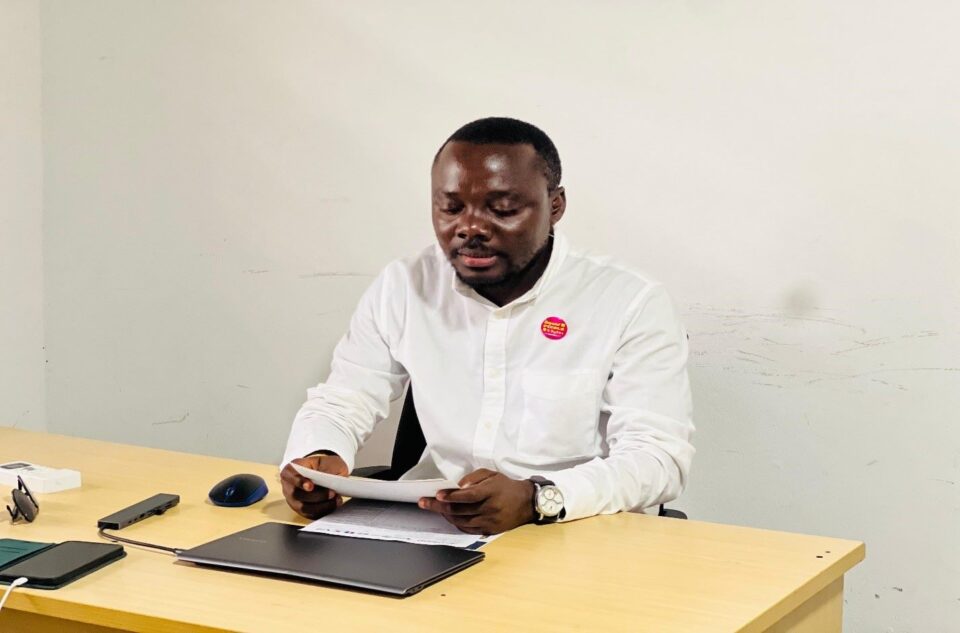PHOTO: CEMESP’s Program Assistant Wremongar Blojay Joe, II
On World Press Freedom Day, the Center for Media Studies and Peacebuilding (CEMESP) released a poignant statement, echoing the sentiments of a nation grappling with the complexities of its media landscape.
At the CEMESP office in Monrovia on Thursday, Program Assistant Wremongar Blojay Joe II, on behalf of CEMESP’s Director Malcolm W Joseph, conveyed the media development group’s message calling for impactful change through new ideas and innovation.
He stated, “Liberia stands at a critical juncture in its media landscape, as the world commemorates World Press Freedom Day on May 3, 2024.”
Drawing from the latest Press Freedom Index for Liberia by Reporters Without Borders, Joe outlined a picture that celebrates the strides made since the end of the civil war while acknowledging persistent challenges, pointing fingers at political interference, ownership, and poor welfare of journalists.
“Despite improvements,” he noted, “political interference in media ownership and content remains a concern.”
He underscored the importance of recent legislative reforms, including the elimination of sedition and defamation laws, as progress towards a more conducive environment for press freedom.
Yet, amidst these advancements, the CEMESP Program Associate highlighted the stark reality of journalists facing economic hardships and the enduring specter of self-censorship due to lack of advertisement and poor management of media entities.
“Many credible reports have spoken to the unacceptable levels at which self-censorship persists,” he lamented, particularly on sensitive topics such as corruption and abuse of power.
The CEMESP statement did not shy away from addressing the darker side of press freedom in Liberia, adding “We continue to witness instances where Liberian law enforcement remains a source of insecurity for journalists.”
The statement urged authorities to ensure accountability for attacks on press freedom.
“The voices of journalists are essential for fostering transparency, accountability, and democracy in Liberia. Liberian authorities must ensure that security personnel who attack journalists are punished for their actions.”
Joe also lauded and emphasized the resilience and diversity of Liberia’s media landscape, calling for concerted efforts to safeguard the safety and freedom of journalists.
He rallied stakeholders to support the establishment of a Media Commission which, according to him, will be responsible for advocating for independent oversight within the media sector.
As the statement reached its climax, Joe called for action in the face of the environmental crisis, aligning with this year’s theme of “Press for the planet.”
“Climate education remains almost nonexistent in Liberia, with inadequate resources and attention devoted to raising awareness about environmental issues.
There is an urgent need to invest in journalists who can serve as educators, effectively communicating climate-related challenges and solutions to the Liberian population,” he declared, urging for prioritized training and empowerment initiatives in environmental reporting.
Joe said he believes that journalists would play a crucial role in fostering climate literacy among citizens and advocating for climate accountability from policymakers and stakeholders and that by empowering journalists with the necessary skills and resources to cover climate issues comprehensively, Liberia can take significant strides towards building a more environmentally aware and resilient society.
He reaffirmed the commitment of the Center for Media Studies and Peacebuilding (CEMESP) to defending press freedom, recognizing it as a fundamental pillar of Liberia’s democratic journey.
“Today, let us reaffirm our commitment,” he concluded, “and press for the planet, our communities, and the integrity of Liberian journalism.”

